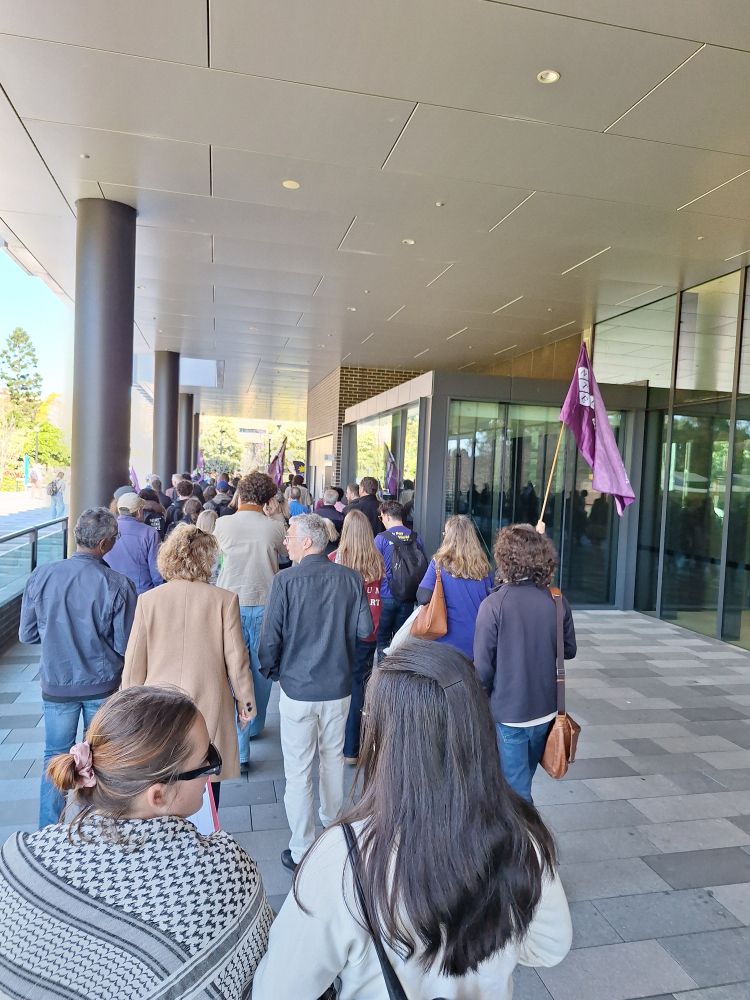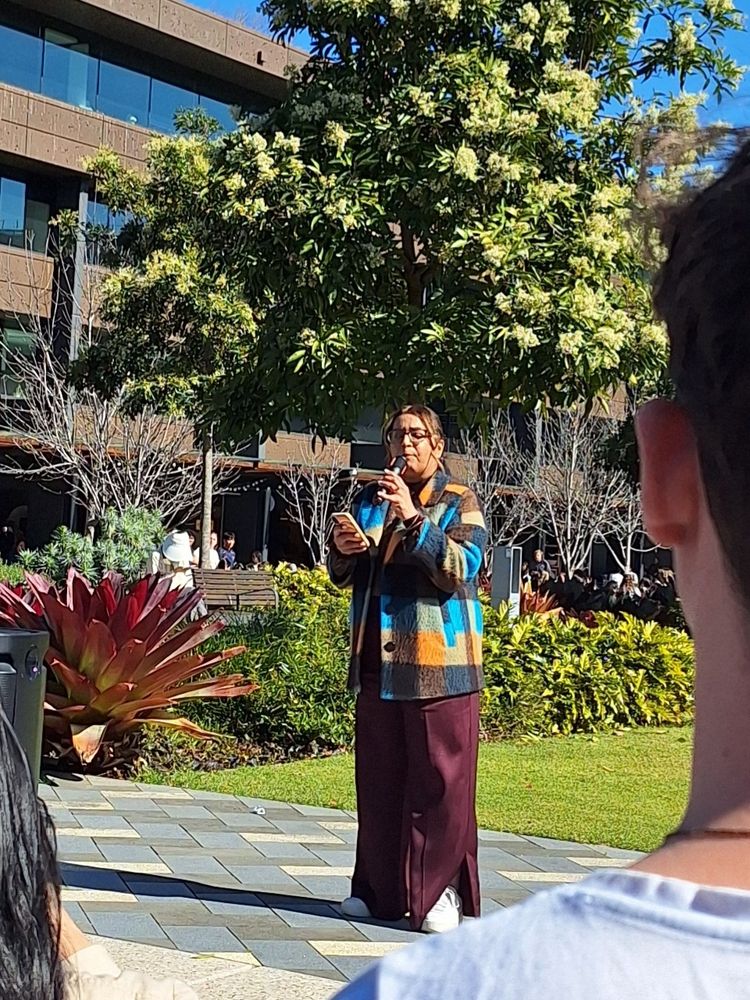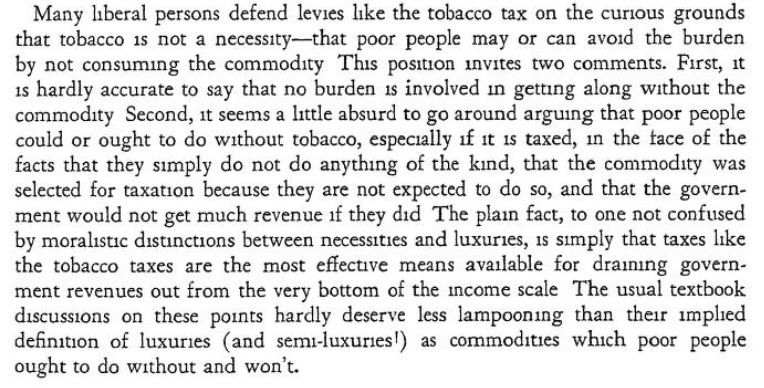
Diagram showing the delegation accountability chain for Australian universities.
Now, Australian universities.
Councils act as principals, appointing Vice-Chancellors, who direct executives, who rely on staff to teach and research. Students and the public receive the outcomes.
But councils do not rely on knowledge. They appoint their own successors.
❌ The loop is broken.
07.09.2025 02:58 — 👍 9 🔁 3 💬 1 📌 0

Neither corporate nor government: Why university governance needs to be different, and better
Marija Taflaga, Francis Markham and Keith Dowding.
Preprint, 29 August 2025. https://doi.org/10.25911/MWW4-9781
Abstract
Australian universities face a governance crisis rooted in failures of accountability. Unlike parliaments and corporate boards, university councils lack effective mechanisms for principals to discipline agents. In parliaments, voters can replace elected representatives; in corporations, shareholders can vote out directors. Both systems close the delegation–accountability loop, ensuring alignment between principals and outcomes. University councils, however, are self-perpetuating bodies dominated by external appointees, and in recent decades they are typically from corporate backgrounds. As neither producers nor consumers of universities’ core product—knowledge creation and dissemination—they have minimal intrinsic stake in academic outcomes leaving councils detached from the university’s core mission. This misalignment fosters mission drift, weakens oversight, and contributes to repeated scandals. Because councils largely appoint their own successors, they remain insulated from meaningful scrutiny, unlike boards or parliaments where underperformance is sanctioned externally. Restoring accountability requires giving academic staff and students a renewed oversight role, alongside clear safeguards for the public interest. Because academics and students are both producers and consumers of knowledge, they have a direct and enduring stake in its quality. We recommend two mechanisms to do this are:
1. Academic Senates empowered to appoint and review council members, ensuring councils reflect the university’s purpose.
2. Robust Committee Systems that embed staff and student voices in decision-making, reduce information asymmetries, and align incentives with academic purposes.
Australian universities are in a governance crisis. VC pay blowouts, scandals, mission drift — these aren’t random, they’re structural.
This new working paper with @marijataflaga.bsky.social & Keith Dowding digs into why the system is broken, and how to fix it.
doi.org/10.25911/MWW...
A thread:
07.09.2025 02:58 — 👍 132 🔁 69 💬 8 📌 6

Bell's departure is overdue, but this crisis is not all her fault. Here's why
It's a symptom arising at many of Australia's universities.
Unless the structures of university governance are fixed, we will see the same failures repeated but with different personnel.
Incisive op-ed from @jack-thrower.bsky.social
11.09.2025 03:56 — 👍 25 🔁 11 💬 1 📌 0
I think there is a puritan streak in public health. Where these ideas that seem logical are popular even if there is no peer reviewed basis for them. The other one that frustrates me is you hear clinicians insist that only water counts towards people’s consumption of liquid
07.09.2025 22:15 — 👍 5 🔁 2 💬 1 📌 0
folks are really obsessed with trying to find evidence artificial sweeteners are bad. to date it's basically been a failed exercise, but that hasn't stopped spurious conclusions getting significant overage.
07.09.2025 11:37 — 👍 175 🔁 49 💬 6 📌 2
universal Medicare safety net - problem solved
06.09.2025 11:27 — 👍 7 🔁 3 💬 0 📌 0
Tapestry also reportedly near disintegration
31.08.2025 07:21 — 👍 41 🔁 11 💬 3 📌 1
the implication of this is there is only one method for improving low-middle incomes that is reliable, rigorous and evidence-based: redistribution. everything else is just talk.
26.08.2025 12:18 — 👍 11 🔁 3 💬 1 📌 0

everyone loves to quote Krugman on productivity growth being almost anything. strangely they never mention his view that productivity is a great mystery, one that is unresponsive to sweeping changes in government policy and ideology, and something that no one knows how to sustainably increase
26.08.2025 11:43 — 👍 29 🔁 8 💬 4 📌 2

My contribution to the welfare state debate: Pre-transfers, the Child Poverty Rate is 100%
[Link below]
25.08.2025 11:39 — 👍 7 🔁 4 💬 1 📌 0

Help USyd Palestine advocates defeat Israel Lobby legal attack!
Dr Nick Riemer and Professor John Keane are academics at the University of Sydney and long-time advocates of freedom and justice for Palestinians. Since October 7, in articles, on social media and at ...
Two Sydney Uni staff members are being sued in Australia's Federal Court by complainants who claim that statements opposing genocide and Zionist oppression of Palestinians are racist hate speech. Please give what you can to help @nickriemer.bsky.social & @professorjkeane.bsky.social's legal defence
18.08.2025 03:14 — 👍 23 🔁 15 💬 0 📌 4

The curve of this building in Darling Harbour is like an archimedes’ death ray
17.08.2025 05:36 — 👍 8 🔁 0 💬 1 📌 0
Good on you Francis. Principled as always. What a shame for ANU
13.08.2025 08:32 — 👍 7 🔁 0 💬 0 📌 0
Hey @sydney.edu.au - Palestinians are starving in a systematic genocide being carried out by the state of Israel. Your pulling this flag down is very clearly partisan and also very clearly not a good look.
07.08.2025 00:45 — 👍 2 🔁 1 💬 0 📌 0

Marching through Macquarie

Ben with Damien

Mehreen Faruqi speaks to rally
Proud to stand with my Sociology colleagues, joined by @mehreenfaruqi.bsky.social @damiencahill.bsky.social and the mighty @nteunion.bsky.social against the devastating cuts proposed at Macquarie University
06.08.2025 05:07 — 👍 36 🔁 9 💬 0 📌 2
Have the police commended the discipline of the protestors anywhere? Incredible to see 100k people come together, little notice, unpleasant conditions and have no problems, despite the existential urgency of the cause
03.08.2025 09:56 — 👍 72 🔁 18 💬 4 📌 1

Israeli rights groups accuse Israel of genocide in Gaza
Reports from B’Tselem and Physicians for Human Rights Israel add to growing domestic criticism of war conduct
“B’Tselem and Physicians for Human Rights Israel released separate reports on Monday saying they had reached the conclusion after documenting 21 months of Israeli military activity and public statements from political leaders.”
www.ft.com/content/dc1f...
30.07.2025 09:29 — 👍 5 🔁 5 💬 0 📌 0

Many Iberal persons defend levies like the tobacco tax on the curious grounds that tobacco is not a necessity-that poor people may or can avoid the burden by not consuming the commodity This position invites two comments. First, it is hardly accurate to say that no burden is involved in getting along without the commodity Second, it seems a little absurd to go around arguing that poor people could or ought to do without tobacco, especially if it is taxed, in the tace of the facts that they simply do not do anything of the kind, that the commodity was selected for taxation because they are not expected to do so, and that the government would not get much revenue if they did The plain fact, to one not confused by moralistic distinctions between necessities and luxuries, is simply that taxes like the tobacco taxes are the most effective means available for draining government revenues out from the very bottom of the income scale The usual textbook discussions on these points hardly deserve less lampooning than their implied definition of luxuries (and semi-luxuries) as commodities which poor people ought to do without and won't.
This incisive excerpt from Henry Simons in 1938 is as relevant now as it ever was
30.07.2025 09:23 — 👍 8 🔁 1 💬 0 📌 0

The first page of the Conclusion chapter of the book "The Foreign Gaze" which opens with a quote from Palestinian journalist writing from Gaza in April 2024, about hunger, malnutrition, and starvation.
"We prefer to die by airstrike. But not to watch our families die slowly from hunger."
The conclusion to The Foreign Gaze started and ended in Gaza; with hunger, malnutrition, and starvation on my mind; with famine on my mind.
It's very painful to watch my fears of Israel and its allies fulfilled.
21.07.2025 13:08 — 👍 20 🔁 8 💬 1 📌 0
Roy Morgan has now restored this data and analysis in full, almost three weeks after it was taken down
22.07.2025 10:24 — 👍 54 🔁 19 💬 0 📌 1
Which is the villain song in frozen? Let it Go or Love is an Open Door?
22.07.2025 08:25 — 👍 0 🔁 0 💬 0 📌 0
![4-panel comic. (1) [Person 1 with ponytail flanked by person with short hair and another person speaking into microphone at podium] PERSON 1: In the early 2010s, researchers found that many major scientific results couldn’t be reproduced. (2) PERSON 1: Over a decade into the replication crisis, we wanted to see if today’s studies have become more robust. (3) PERSON 1: Unfortunately, our replication analysis has found exactly the same problems that those 2010s researchers did. (4) [newspaper with image of speakers from previous panels] Headline: Replication Crisis Solved](https://cdn.bsky.app/img/feed_thumbnail/plain/did:plc:cz73r7iyiqn26upot4jtjdhk/bafkreibwuu57ullc7vacjyno6c5z3gtyakkg2qub6cn3dbbjdpn2kaowmi@jpeg)
4-panel comic. (1) [Person 1 with ponytail flanked by person with short hair and another person speaking into microphone at podium] PERSON 1: In the early 2010s, researchers found that many major scientific results couldn’t be reproduced. (2) PERSON 1: Over a decade into the replication crisis, we wanted to see if today’s studies have become more robust. (3) PERSON 1: Unfortunately, our replication analysis has found exactly the same problems that those 2010s researchers did. (4) [newspaper with image of speakers from previous panels] Headline: Replication Crisis Solved
Replication Crisis
xkcd.com/3117/
21.07.2025 23:54 — 👍 4887 🔁 657 💬 28 📌 30
Water privatisation has been a complete & utter failure.
It is absurd that the government's report into the water industry didn't even consider public ownership.
That's not a report. That's a political broadcast for the private sector.
Put water back into public hands, now.
21.07.2025 09:54 — 👍 6336 🔁 1520 💬 178 📌 74

Survey of Income and Housing results will not be released
This is pretty bad. The survey of income and housing is one of the ABS's most important economic data collections. And the previous wave was cancelled due to Covid, so we're stuck with very old data until 2027.
Big questions to ask about how this happened.
17.07.2025 02:52 — 👍 37 🔁 21 💬 3 📌 1

Exclusive: Smoking data taken down after link to vape ban
A report showing increased smoking and vaping among young Australians was pulled after it embarrassed the government and led to complaints from other researchers.
The curious case of the disappearing smoking data. The Roy Morgan release was unequivocal: smoking rates among young adults are up after vaping ban which had "demonstrably failed". And then it disappeared and was replaced with something more amenable. www.thesaturdaypaper.com.au/news/health/...
19.07.2025 07:18 — 👍 221 🔁 81 💬 14 📌 6

Exclusive: Smoking data taken down after link to vape ban
A report showing increased smoking and vaping among young Australians was pulled after it embarrassed the government and led to complaints from other researchers.
Great reporting from @squigglyrick.bsky.social.
Australia’s approach to nicotine regulation is clearly failing. We need greater transparency and accountability in public health policy and advocacy.
www.thesaturdaypaper.com.au/news/health/... via @thesaturdaypaper.com.au
19.07.2025 06:35 — 👍 4 🔁 2 💬 1 📌 0
Researching, innovating, writing & influencing
Working at intersection of #Ethics, #Technology & #Sustainability via lens of #Cybersystemics, grounding a radical way of engaging with #social #complexity
#Trust #DigitalTransformation #EmergingTech #futures
Palestinian organiser 🇵🇸 | Research scientist 🧬 | 🏳️🌈 | Opinions here my own
Research person. Parliament. Canberra.
Winner of the 2025 JJ Giltinan Shield.
Historian:19th-century France—juvenile incarceration, prisons, settler/penal colonies (esp New Caledonia)
Book "Dangers of Youth" www.mqup.ca/dangers-of-youth-products-9780228024330.php
Based in Sydney, Australia
The Australian Basic Income (ABI) Lab is a collaboration between the Australian National University (ANU), Macquarie University and the University of Sydney. Check us out at https://www.ausbasicincome.org/
National Tertiary Education Union (NTEU) is the union for all higher education staff in Australia.
Authorised by D.Cahill, Melbourne National Tertiary Education Union
#Teaching specialist, School of Public Health, University of Adelaide, Australia. DEI in teaching. #AuDHD, #Queer, #PublicHealth, #Sociology, #Ethics. Semi-pro musician. These immaculate vibes are my own, not my employer's.
ORCID: 0000-0002-4089-399
An independent weekly newspaper, from the publisher of @themonthly.com.au
📨 Newsletters: http://satpa.pe/4Yzr3gJ
🗞️ Subscriptions: http://satpa.pe/pNZhFij
please science correctly
if you do i will buy you a small cake and we can be friends
director: medicalevidenceproject.org
the book: forensicmetascience.com
Tech, policy, politics. Political editor @ The New World, Fellow @ Demos, newsletter @ techtris, PhD researcher @ UCL Laws. Latest book: The Other Pandemic – How QAnon Contaminated The World. 🏳️🌈
https://www.jamesrball.com/
I write the media/internet/culture/politics/whatever newsletter The Present Age: www.readtpa.com
Chicagoan / wife of @kaylapekkala.com / second favorite human to two dogs / not an activist / likes baseball
Assistant Professor at Spelman College. Author of The Political Theory of Liberal Socialism and other books.
Assistant professor in Belgium. Philosophy and history of medicine. Many other things. Autrice "Pilules Roses", julietteferrydanini.com
Climate, energy, political theory, social movements | Postdoc at the University of Sussex researching fossil fuel phaseouts @suspol.bsky.social | Visiting Fellow at LSE | PhD in Politics from the University of Edinburgh | www.lukasslothuus.com
Following Southeast Asia and Timor-Leste, mostly elections, FP and Instagram posts. Don't complain to me that I don't cover business enough, I do not know of such things.
Read my newsletter 🤓 https://darimulut.substack.com
Posting for California YIMBY about housing, and for myself about skateboarding and cameras. Tradeoffs are real. he/him
📍 San Francisco
Assemblymember. Democratic Nominee for Mayor of NYC. Running to freeze the rent, make buses fast + free, and deliver universal childcare. Democratic Socialist. zohranfornyc.com
















![4-panel comic. (1) [Person 1 with ponytail flanked by person with short hair and another person speaking into microphone at podium] PERSON 1: In the early 2010s, researchers found that many major scientific results couldn’t be reproduced. (2) PERSON 1: Over a decade into the replication crisis, we wanted to see if today’s studies have become more robust. (3) PERSON 1: Unfortunately, our replication analysis has found exactly the same problems that those 2010s researchers did. (4) [newspaper with image of speakers from previous panels] Headline: Replication Crisis Solved](https://cdn.bsky.app/img/feed_thumbnail/plain/did:plc:cz73r7iyiqn26upot4jtjdhk/bafkreibwuu57ullc7vacjyno6c5z3gtyakkg2qub6cn3dbbjdpn2kaowmi@jpeg)


